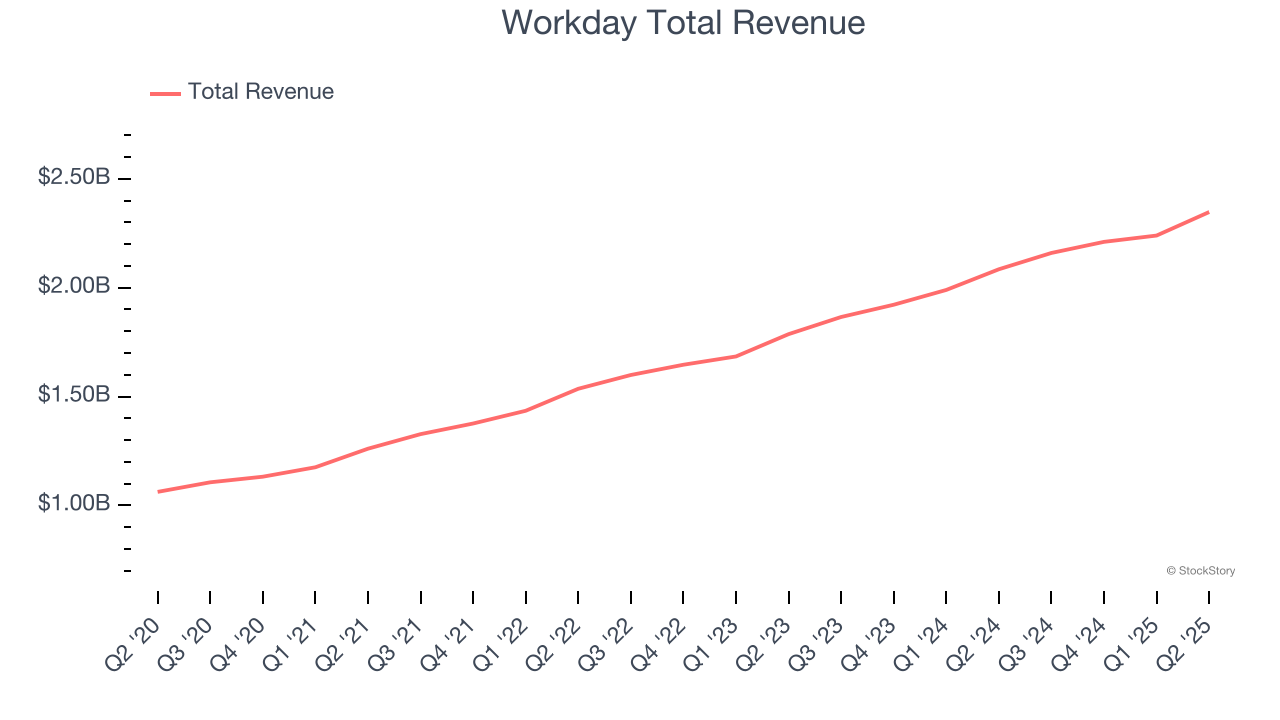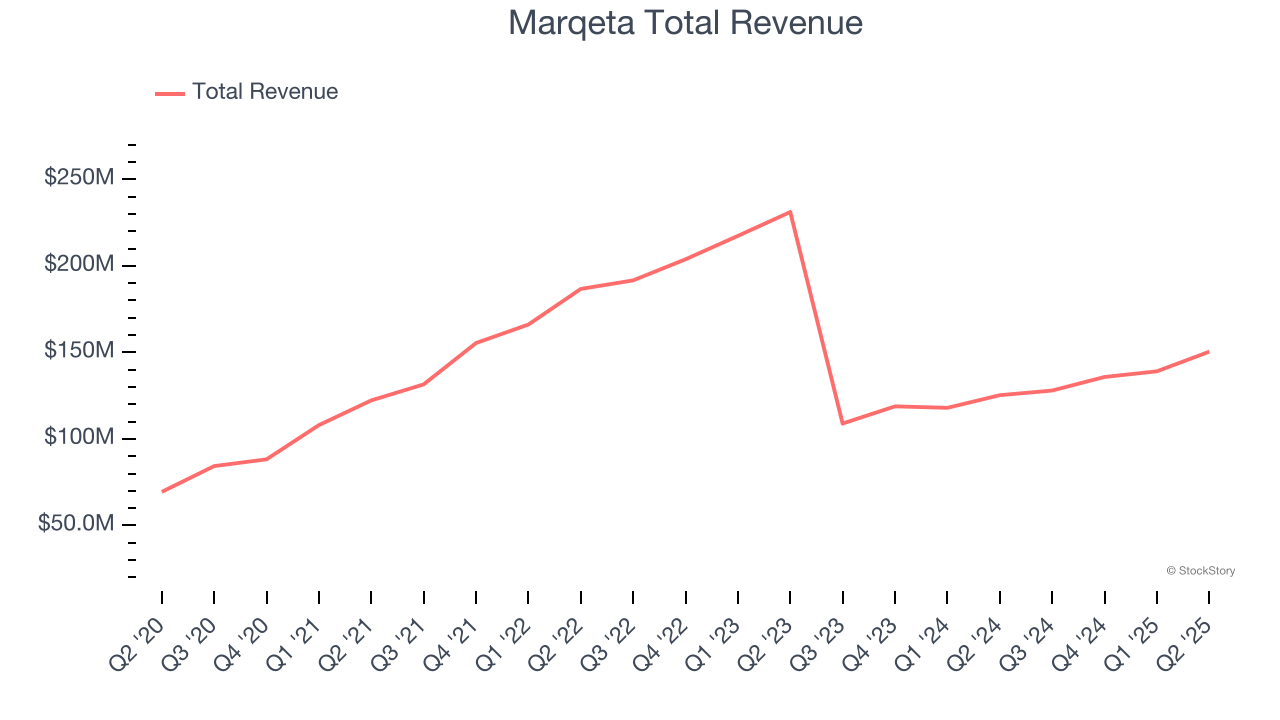
The end of the earnings season is always a good time to take a step back and see who shined (and who not so much). Let’s take a look at how finance and hr software stocks fared in Q2, starting with Workday (NASDAQ: WDAY).
Organizations are constantly looking to improve organizational efficiencies, whether it is financial planning, tax management or payroll. Finance and HR software benefit from the SaaS-ification of businesses, large and small, who much prefer the flexibility of cloud-based, web-browser delivered software paid for on a subscription basis than the hassle and expense of purchasing and managing on-premise enterprise software.
The 13 finance and HR software stocks we track reported a mixed Q2. As a group, revenues beat analysts’ consensus estimates by 1.8% while next quarter’s revenue guidance was 1% below.
Thankfully, share prices of the companies have been resilient as they are up 8.5% on average since the latest earnings results.
Workday (NASDAQ: WDAY)
Born from the vision of PeopleSoft founders after Oracle's hostile takeover of their previous company, Workday (NASDAQ: WDAY) provides cloud-based software for financial management, human resources, planning, and analytics to help organizations manage their business operations.
Workday reported revenues of $2.35 billion, up 12.6% year on year. This print was in line with analysts’ expectations, and overall, it was a satisfactory quarter for the company with an impressive beat of analysts’ EBITDA estimates but billings in line with analysts’ estimates.
"Workday delivered another solid quarter, driven by our AI and platform innovation, international momentum, and an ecosystem that continues to grow alongside us," said Carl Eschenbach, CEO, Workday.

Interestingly, the stock is up 1.2% since reporting and currently trades at $230.30.
Is now the time to buy Workday? Access our full analysis of the earnings results here, it’s free.
Best Q2: Marqeta (NASDAQ: MQ)
Powering the cards behind innovative fintech services like Block's Cash App, Marqeta (NASDAQ: MQ) provides a cloud-based platform that allows businesses to create customized payment card programs and process card transactions.
Marqeta reported revenues of $150.4 million, up 20.1% year on year, outperforming analysts’ expectations by 6.9%. The business had a very strong quarter with an impressive beat of analysts’ EBITDA and total payment volume estimates.

Marqeta delivered the biggest analyst estimates beat among its peers. The market seems happy with the results as the stock is up 6.1% since reporting. It currently trades at $6.04.
Is now the time to buy Marqeta? Access our full analysis of the earnings results here, it’s free.
Weakest Q2: Paychex (NASDAQ: PAYX)
Once known as the go-to service for small business payroll needs, Paychex (NASDAQ: PAYX) provides payroll processing, HR services, employee benefits administration, and insurance solutions to small and medium-sized businesses.
Paychex reported revenues of $1.43 billion, up 10.2% year on year, falling short of analysts’ expectations by 1.1%. It was a disappointing quarter as it posted a miss of analysts’ EBITDA estimates.
As expected, the stock is down 12% since the results and currently trades at $133.93.
Read our full analysis of Paychex’s results here.
Paylocity (NASDAQ: PCTY)
Operating in a field where companies traditionally juggled multiple disconnected systems, Paylocity (NASDAQ: PCTY) provides cloud-based human capital management and payroll software solutions that help businesses manage their workforce and HR processes.
Paylocity reported revenues of $400.7 million, up 12.2% year on year. This number surpassed analysts’ expectations by 3.1%. Taking a step back, it was a satisfactory quarter as it also logged a solid beat of analysts’ EBITDA estimates but full-year guidance of slowing revenue growth.
The stock is down 5.3% since reporting and currently trades at $172.04.
Read our full, actionable report on Paylocity here, it’s free.
Intuit (NASDAQ: INTU)
Originally named after its founding product "Intuitive for the first-time user," Intuit (NASDAQ: INTU) provides financial management software and services including TurboTax, QuickBooks, Credit Karma, and Mailchimp to help consumers and small businesses manage their finances.
Intuit reported revenues of $3.83 billion, up 20.3% year on year. This result topped analysts’ expectations by 2.1%. Zooming out, it was a satisfactory quarter as it also produced a solid beat of analysts’ billings estimates but full-year guidance of slowing revenue growth.
The stock is down 4.3% since reporting and currently trades at $668.05.
Read our full, actionable report on Intuit here, it’s free.
Market Update
Thanks to the Fed’s series of rate hikes in 2022 and 2023, inflation has cooled significantly from its post-pandemic highs, drawing closer to the 2% goal. This disinflation has occurred without severely impacting economic growth, suggesting the success of a soft landing. The stock market thrived in 2024, spurred by recent rate cuts (0.5% in September and 0.25% in November), and a notable surge followed Donald Trump’s presidential election win in November, propelling indices to historic highs. Nonetheless, the outlook for 2025 remains clouded by potential trade policy changes and corporate tax discussions, which could impact business confidence and growth. The path forward holds both optimism and caution as new policies take shape.
Want to invest in winners with rock-solid fundamentals? Check out our 9 Best Market-Beating Stocks and add them to your watchlist. These companies are poised for growth regardless of the political or macroeconomic climate.
StockStory is growing and hiring equity analyst and marketing roles. Are you a 0 to 1 builder passionate about the markets and AI? See the open roles here.




